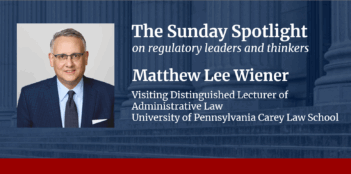
ACUS floats proposals to make rule review faster and more transparent.
Regulation impacts nearly every aspect of our lives. The medications we take, the seatbelts we buckle, and the very air we breathe are all subject to regulation. Sometimes, however, regulations that impact the health and safety of the public and the environment are significantly delayed in getting adopted because they are subject to review by the White House Office of Information and Regulatory Affairs (OIRA).
In response to increased delays in rule review, the Administrative Conference of the United States (ACUS) recently released a draft statement that focuses on ways to decrease the time it takes OIRA to review regulations. The draft statement has since been updated to incorporate public comments.
Recently, ACUS initiated its project to examine how well OIRA adheres to timelines for rule review established in Executive Order 12866.
This executive order, issued by President Clinton and retained by both Presidents Bush and Obama, gives OIRA authority to review rules deemed to be significant. Significant rules are rules expected to have a negative, material impact on the economy, especially if they impose impacts annually of $100 million or more.
Independent regulatory agencies, such as the Securities and Exchange Commission and the Federal Communications Commission, are not subject to OIRA review.
But the executive order requires that OIRA complete its review of a proposed rule within 90 days of the rule’s submission to OIRA by the government agency seeking to issue the rule. OIRA’s review may be extended once for a maximum of 30 days if such extension is approved by OIRA’s director and if requested by the head of an agency. In short, the executive order seems to limit a rule’s review period to 120 days.
ACUS commissioned a consultant’s report by Curtis W. Copeland on the length of time it actually takes OIRA to review rules. Copeland found that, between 1994 and 2011, OIRA’s average review time did not exceed 62 days. In 2012, by contrast, the average review time rose to 79 days. Significantly, in the first six months of 2013, the average review time increased still further to 140 days. In addition, even though in 2011 only two agencies had an average review time of longer than 90 days, by 2012 this number increased to seven. In the first six months of 2013 alone, seventeen agencies had an average review time of more than 90 days.
Copeland suggested that review times might actually take longer than the numbers indicate. According to interviews with regulatory agency employees, OIRA sometimes requests informal reviews, beginning the process of collecting information and evaluating agency rules before the rules are officially submitted to OIRA. These informal reviews do not count toward the 90-day review period and on some occasions can last for significant periods of time. In addition, there is some evidence that OIRA marks a rule as “received” on a later date than the rule was submitted for review.
Further drawing on interviews with regulatory agency employees, Copeland identified a number of issues that may be leading to increasingly long rule reviews. For example, some of his interview respondents apparently noted that review times increased in 2011-2012 due to concerns from the Executive Office about issuing divisive or costly rules prior to the 2012 presidential election. In addition, some respondents opined that OIRA staff members have been asking for increasing amounts of information and conducting more extensive economic analyses of rules with little oversight from senior management. Some of these interviewees believed that such requests and analyses not only increase review time, but also go beyond the scope of OIRA’s review authority.
Interview respondents also reportedly suggested that OIRA has expanded the definition of “significant” rules that are subject to regulatory review. One agency employee even reportedly expressed the view that “the presumption seems to be that all rules are significant.”
Other respondents expressed the view that interagency rule review, in which OIRA passes a rule to other executive branch departments for comment, has contributed to the lengthening of review time. Decreased OIRA staffing was also mentioned as a possible contributing factor.
Some of Copeland’s interview respondents noted that completing a rule review within 90 days simply does not seem to be a priority for OIRA. This could be due to the fact that OIRA reads 12866 as allowing an agency to request an indefinite extension for review (and apparently OIRA often asks that an agency do so). Furthermore, there seem to be no repercussions if OIRA fails to complete a rule review in a timely manner.
Although Copeland indicated that the pace of OIRA review times recently seems to be shortening, he believes that reviews are still not conducted as envisioned by Executive Order 12866.
Based on Copeland’s report, ACUS has outlined and revised six possible proposals to help reduce review time and increase transparency in OIRA’s oversight of agency rulemaking:
- OIRA’s administrator “should consider preparing a publicly available document” that outlines policies to make sure review times return to prior rates.
- All those involved in a rule review should issue and respond to comments as soon as possible.
- If OIRA cannot complete a rule review in a timely manner, it should consider “returning the…rule to the…agency” and issuing a publicly-viewable letter that explains why, under 12866, it cannot complete the review on time.
- OIRA and agencies planning to submit rules for review should meet to discuss upcoming rule submissions, substantive issues relating to those rules, and “other agencies” that may want to be involved in the rule review.
- Preliminary discussions between OIRA and the agency submitting a rule for review should address “the anticipated review process” and staffing concerns. Although time spent on preliminary discussions should not count towards the formal review period, the agency should decide when it will formally submit its rule for review.
- OIRA should increase its staff as necessary to ensure timely rule review.
ACUS is a federal agency that works to improve the rulemaking process by performing research and issuing recommendations to other federal agencies. ACUS recently held a public meeting to discuss Copeland’s report and the potential proposals outlined above. A second meeting was held earlier this month, and a final meeting will be held later this week.



